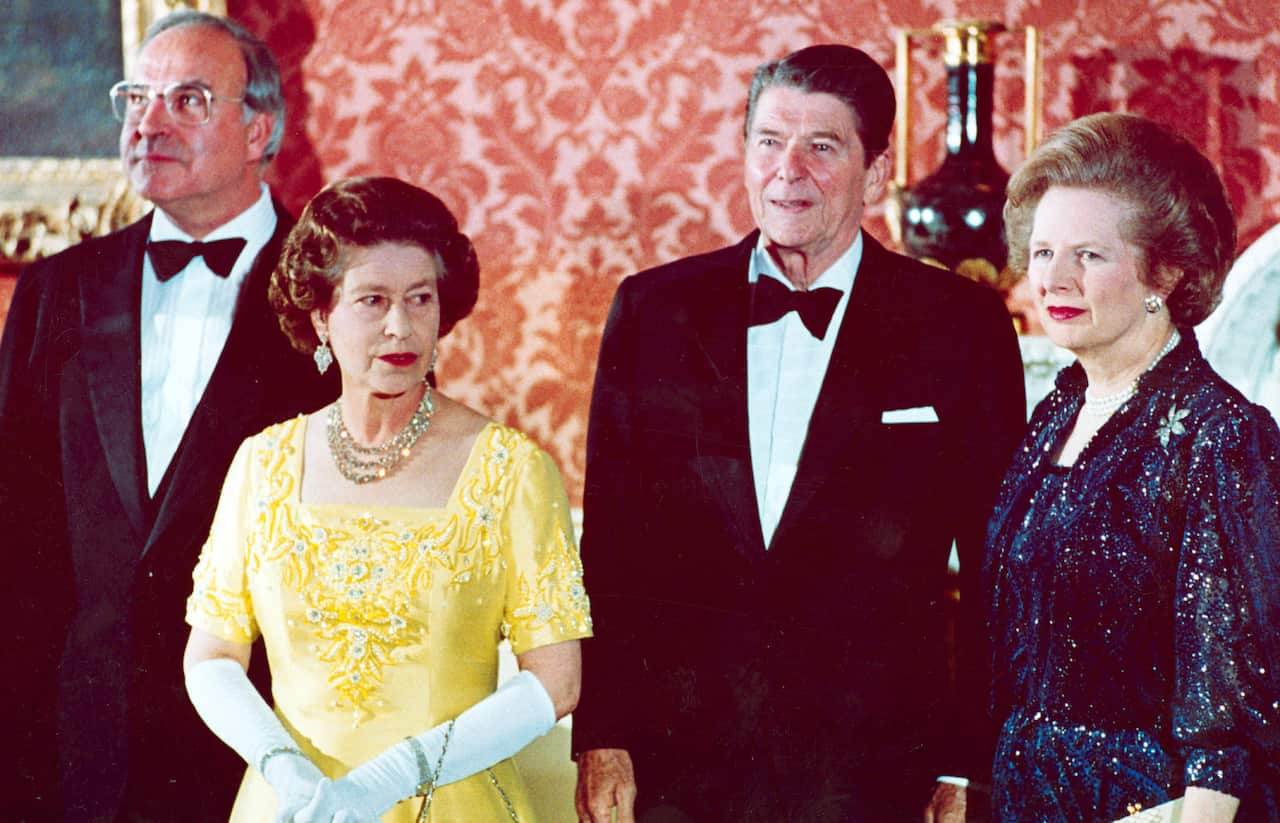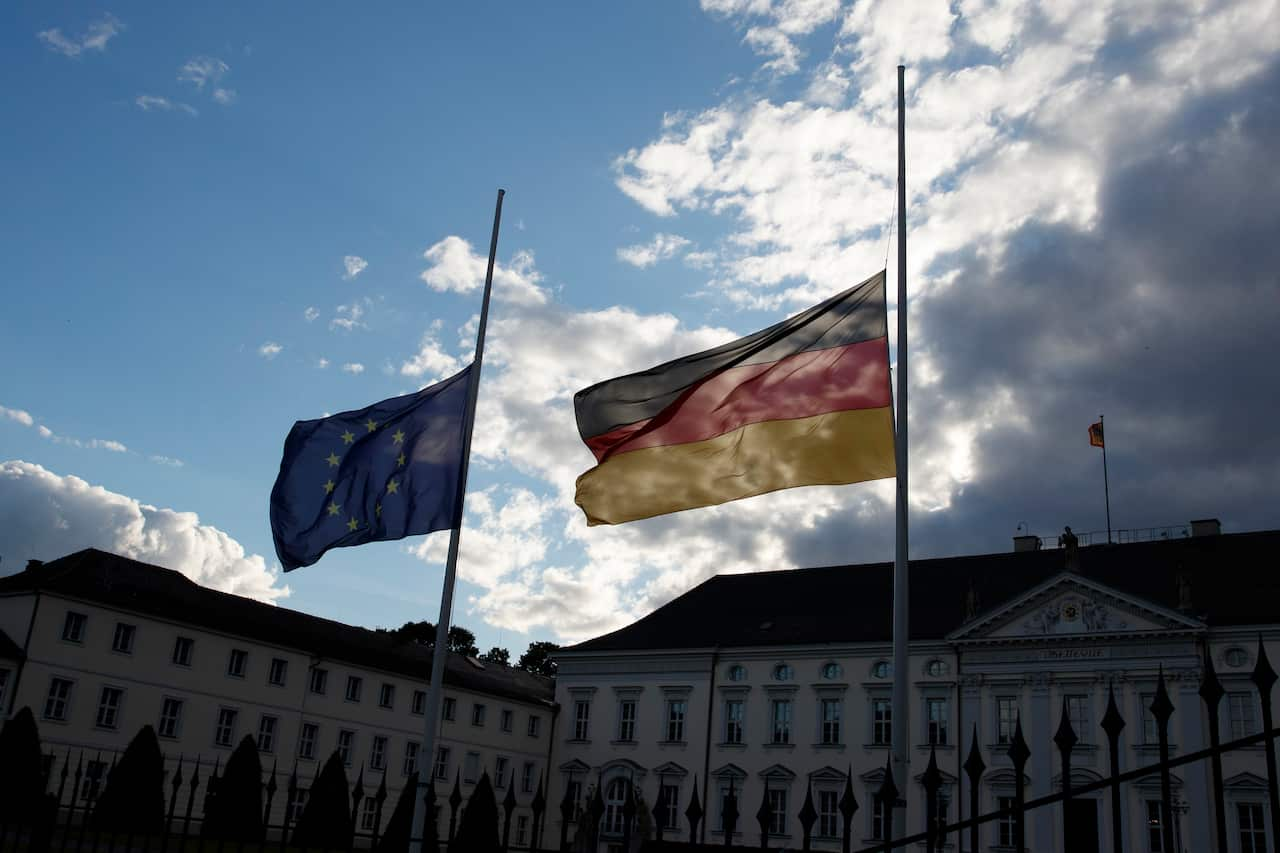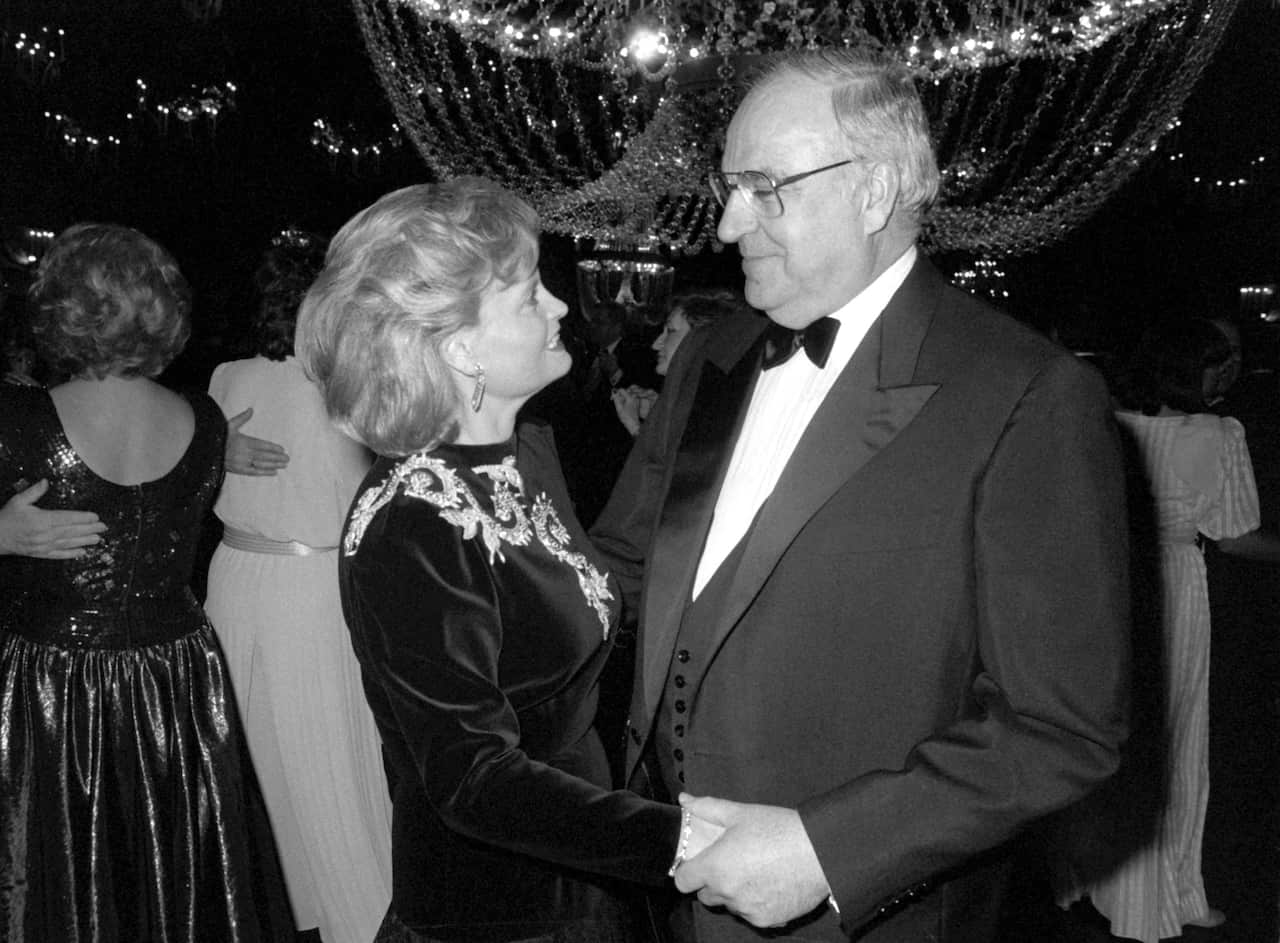Helmut Kohl, the physically imposing German chancellor whose reunification of a nation divided by the Cold War put Germany at the heart of a united Europe, has died at his home in Ludwigshafen aged 87.
"A life has ended and the person who lived it will go down in history" said German Chancellor Angela Merkel, speaking from Rome on Friday.
"Helmut Kohl was a great German and a great European." Over his 16 years at the country's helm from 1982 to 1998 - first for West Germany and then for all of a united Germany - Kohl engaged in a dogged pursuit of European unity.
Over his 16 years at the country's helm from 1982 to 1998 - first for West Germany and then for all of a united Germany - Kohl engaged in a dogged pursuit of European unity.

Britain's Queen Elizabeth II, second left, standing with Kohl, U.S. President Ronald Reagan, and UK Prime Minister Margaret Thatcher Source: AP
Less than a year after the November 1989 fall of the Berlin Wall, he spearheaded the end of Germany's decades-long division into East and West, ushering in a new era in European politics.
It was the close friendships that Kohl built up with other world leaders that helped him persuade both anti-communist Western allies and the leaders of the collapsing Soviet Union that a strong, united Germany could live at peace with its neighbours.
Former world leaders react to Kohl's death
Former US President George H.W. Bush said the world had lost "a true friend of freedom."
"Working closely with my very good friend to help achieve a peaceful end to the Cold War and the unification of Germany within NATO will remain one of the great joys of my life," Bush said.
"Throughout our endeavours, Helmut was a rock - both steady and strong."
Russian President Vladimir Putin credited Kohl with "playing a key role in putting an end to the Cold War and with the reunification of Germany."
Famed for a massive girth on his 1.93-metre frame, Kohl still moved nimbly in domestic politics and among rivals in his conservative Christian Democratic Union, holding power for 16 years.
That was followed by the eruption of a party financing scandal which threatened to tarnish his legacy. Kohl's legacy includes the common euro currency that bound Europe more closely together than ever before. Kohl lobbied heavily for the euro, introduced in 1999, as a pillar of peace - and when it hit trouble more than a decade later, he insisted there was no alternative but for Germany to help out debt-strapped countries like Greece.
Kohl's legacy includes the common euro currency that bound Europe more closely together than ever before. Kohl lobbied heavily for the euro, introduced in 1999, as a pillar of peace - and when it hit trouble more than a decade later, he insisted there was no alternative but for Germany to help out debt-strapped countries like Greece.

A German national flag and European Union flag fly at half mast after the announcement of the death of the former German Chancellor Helmut Kohl Source: AAP
Kohl's early years
Born on April 3, 1930, in Ludwigshafen, a western industrial city on the Rhine, Kohl joined the Hitler Youth but missed serving in the Nazi army. As a 15-year-old, he was about to be pressed into service in a German anti-aircraft gun unit when World War II ended. His oldest brother, Walter, was killed in action a few months earlier.
A Roman Catholic, Kohl joined the CDU in his teens shortly after its postwar founding. He earned his doctorate in 1958 at the University of Heidelberg with a dissertation on the politics of Rhineland-Palatinate and became governor of that western state in 1969.
His first attempt to unseat Social Democratic Chancellor Helmut Schmidt failed in 1976, but Kohl seized his chance six years later, taking power in October 1982 when a junior coalition party switched sides.
He won elections in 1983 and 1987, then rode to an election triumph in 1990 on a wave of post-unity euphoria.
Kohl was helped in securing German unity by his friendships with French President Francois Mitterrand and Soviet leader Mikhail Gorbachev, who approved NATO membership for a united Germany and agreed to pull Soviet troops out of East Germany.
The stationing of US Pershing II missiles starting in 1983, despite huge domestic protests, had established trust in Washington that was crucial to creating a single German state.
Kohl's role in German reunification
In a poignant gesture of reconciliation in 1984, Kohl held hands with Mitterrand during a ceremony at a World War I cemetery in Verdun, France.
Elation over German reunification ebbed amid the harsh realities of its cost and the difficulties of integrating east and west, but Kohl's coalition squeaked by again in 1994. Yet high unemployment and Germans' yearning for change gradually sapped his authority, provoking a humiliating loss to Gerhard Schroeder's centre-left Social Democrats in 1998.
The following year, Kohl plunged his party into crisis when he admitted accepting undeclared donations during his time as chancellor. Kohl refused to identify the donors.
When Bonn prosecutors launched an investigation into possible breach-of-trust charges in January 2000, Kohl was pressured to give up his party's symbolic honorary chairmanship - notably by Merkel, a longtime Kohl protegee.
In a 2001 deal with Bonn prosecutors, the probe was dropped in exchange for a 300,000-mark fine, giving Kohl the legal stamp of innocence.
The former chancellor was married for 41 years to Hannelore Renner, an interpreter of English and French who stood firmly but discreetly by his side. They had two sons, Peter and Walter. In July 2001, Hannelore killed herself at age 68 in despair over an incurable allergy to light. In 2005, Kohl introduced his new partner Maike Richter, an economist some 35 years his junior. The couple married in May 2008.
In July 2001, Hannelore killed herself at age 68 in despair over an incurable allergy to light. In 2005, Kohl introduced his new partner Maike Richter, an economist some 35 years his junior. The couple married in May 2008.

FILE: German chancellor Helmut Kohl and his wife Hannelore dance during the Presseball on 11 January 1987 in Berlin, Germany. Source: AAP
Despite their differences, Merkel made clear on Friday that Kohl had touched her life deeply when he helped forge a united Germany.
"Like millions of others, I was able to go from a life under a dictatorship to a life of freedom," she said. "He will continue to live in our memories as a great European and as the Chancellor of reunification."
Share




